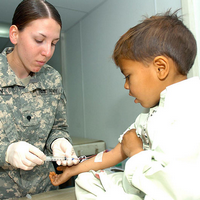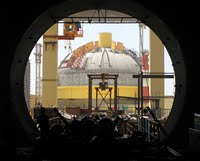Jeff McCausland, senior fellow at the Carnegie Council, wears many hats. As a retired Army colonel who’s on a first name basis with Gen. David Petraeus and Gen. Stanley McChrystal, he has an acutely military perspective on the war in Afghanistan. As an analyst, professor, and former dean of academics of the U.S. Army War College, he also sees the conflict through an academic lens. When McCausland spoke to a small group at the council’s headquarters in New York yesterday, he combined these two perspectives and outlined the unique challenges of this particular war. To surge or not to surge? […]
Central Asia Archive
Free Newsletter
A new survey by the Asia Foundation shows that more people inAfghanistan feel the country is moving in the right directioncompared to the same poll last year. Those who felt that Afghanistanwas, in fact, worse for the wear, contributed the downfall to a lack ofsecurity and corruption. VOA News’ Meredith Buel reports on theresults.

BAGRAM, Afghanistan — In March, ordnance exploded on a home in Kapisa province, in northeast Afghanistan. One child died. Another, 6-year-old Razia, was badly burned. When Aziz, her father, took her in his arms, Razia’s scalp came away in his hands. In early interviews, Aziz blamed the explosion on the U.S.-led coalition. U.S. Air Force officers said the ordnance might have been white phosphorous, a specialized incendiary that the Taliban is unlikely to possess. Later, Aziz claimed the Taliban had, in fact, fired rockets on his home. Regardless of who actually caused Razia’s injuries, it was the Americans that evacuated […]
NewsHour’s Margaret Warner interviews Rory Stewart, author, activist and former British diplomat who walked across Afghanistan as part of a larger trek across Asia. Stewart projects a time frame of 20 to 30 years before Afghanistan reaches levels of government functionality akin to that of neighboring Pakistan.
At a Brookings Institution event on Oct. 16, “The Afghanistan Debate: Assessing the President’s Policy Options,” Senior Fellow Bruce Riedel and Georgetown Visiting Professor Paul Pillar disagreed on the merit of military engagement in Afghanistan. Riedel says President Obama’s assessment of the volatile situation in the borderlands between Afghanistan and Pakistan is not only correct, but reason to continue military efforts in the region. Pillar’s approach to military presence in Afghanistan is much more cautionary. He says that regardless of stabilization, terrorism will continue to spread globally.
Kai Eide, UN Special Representative to Afghanistan, is making it clear that he expects the second round of elections in Afghanistan, which are fast approaching, to be riddled with similar problems as the first. He suggests the silver lining is that this time around, less fraud can be expected. In an interview with Al-Jazeera’s Imran Garda, Eide deflects questions of culpability for the firing of one of Aide’s subordinates, Peter Galbraith, who denounced corruption right after the first round election took place.
President of Afghanistan, Hamid Karzai, accepted an internationally called for runoff election while speaking alongside Senator John Kerry (D-Mass.) in Kabul. In the first round vote two months ago, one-third of Karzai’s votes were discarded after being deemed fraudulent by the Independent Election Commission. It is unclear what, if any, involvement Karzai had in the initial election violations, but it is apparent that he is now prepared to go ahead with a second round of voting. “We consider the decision made by the Independent Election Commission as legal and right,” he says. The runoff election, which will pit Karzai against […]
The U.N. Office on Drugs and Crime released a report detailing the effects of a $15 billion industry – the Afghan opium trade. The report connects instability in Central Asia and global heroin addiction to the Taliban-taxed drug. The UNODC explains that insurgent groups derive anywhere from $90-160 million in revenue from opium taxes and that the trade could be financing insurgents across borders. Paradoxically, as the drug is globally smuggled, leaving a trail of addiction in places such as India and China, wealthier nations are intercepting less of the drug at their borders.
The Asia Society’s Jamie Metzl, a Kabul-based election monitor in the first round of Afghan elections, says a power sharing agreement may be the only way for current President of Afghanistan Hamid Karzai to regain any sort of legitimacy to his regime. He explains the expansive ‘systemic’ nature of voter fraud and how that implicates the Karzai government. World Focus’ Daljit Dhaliwal speaks with Metzl.
Bruce Riedel, Author of The Search For Al Qaeda,speaks with NewsHour’s Margaret Warner at the Brookings Institution.The Brookings Senior Fellow chaired the inter agency review that led tothe first Obama Afghanistan strategy. In light of voter fraud, Riedelencourages a runoff. “On the whole, it is a good thing,” he said. But the Afghanistan-Pakistan expert cautions that a runoff will only be effective if it can restore legitimacy to the process.
NewsHour’s Margaret Warner interviews former Afghan presidential candidate, Ashraf Ghani. Ghani explains the fears of the average Afghan that without a clear government in place, widespread fractionalized violence will return throughout the country. He says of his fellow countrymen, “They’d rather have a bad government then no government at all.”

Following the Nuclear Supplier Group’s waiver in September 2008, India seems ready to take its place in the world of nuclear trade — not just as a purchaser, but as a supplier, too. It appears that Kazakhstan is in line to be India’s first customer for indigenously developed 220 megawatt electric (MWe) Pressurized Heavy Water Reactors (PHWRs). The proposed sale seems likely to follow the civil nuclear agreement signed by the two countries in January 2009. In addition to Kazakhstan, a number of Southeast Asian and African countries are also in serious talks with the Indian state-owned nuclear industry major, […]
